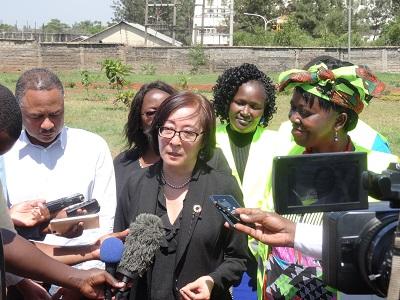
Mami Mitzutori speaking with the press in Kisumu yesterday flanked by city manager Doris Ombara, and head of Africa regional office, Amjad Abbashar
By Denis McClean
KISUMU, 13 March, 2019 - The Kenyan city of Kisumu, long praised for its work on disaster risk reduction, has offered to be a training ground for other cities in Kenya and neighboring countries.
The offer was extended yesterday by Kisumu City Manager, Doris Ombara, during a “resilience tour” of the city and county by the UN Special Representative of the Secretary-General for Disaster Risk Reduction, Mami Mizutori, as she marked one year in office.
Ms. Mizutori praised the pioneering role that Kisumu has played in the development of the Making Cities Resilient Campaign since 2010. “Now I understand why I kept hearing the name of Kisumu so often over the last twelve months that I decided I had to visit,” she said.
The experience of Kisumu and other cities participating in the EU backed project: “Making cities sustainable and resilient: implementing the Sendai Framework for Disaster Risk Reduction 2015-2030 at the local level” will inform the second phase of the campaign scheduled to start in 2020.
The day started with the city’s DRR focal point, Celestine Collins, providing an overview of the challenges facing Kenya’s third largest city located by the world’s largest fresh water lake, Lake Victoria. The population of 600,000 swells to one million during the day and 60% of the people live in slums or informal settlements.
The city and county managers are challenged with a wide range of disaster scenarios including floods, drought, fires, water and energy supply, solid waste management and decaying infrastructure including asbestos sewerage pipes.
The first stop was in a rural area east of Kisumu where locals gathered to talk about the benefits that a new bridge would bring during the rainy season about to get underway next month. In the past, floods in the area have prevented pregnant women reaching the maternity hospital, children from attending school, farmers and other traders bringing their produce to market.
In a ceremony on the bridge, retired school principal, Kevin Kooguya, said he felt particularly sorry for sugar cane farmers who could not bring their harvest to market during the rainy season with dire economic consequences for their families.